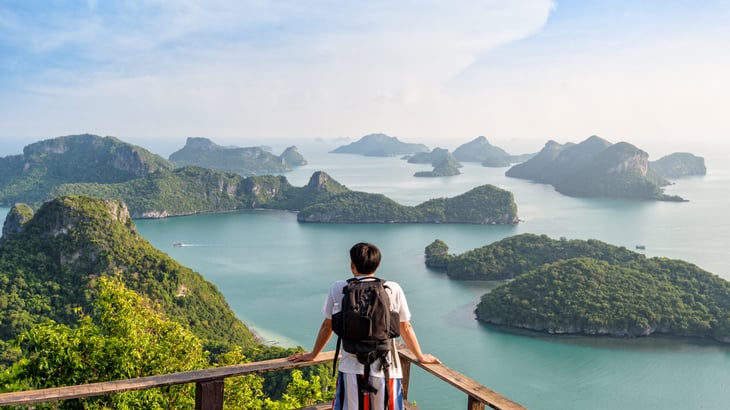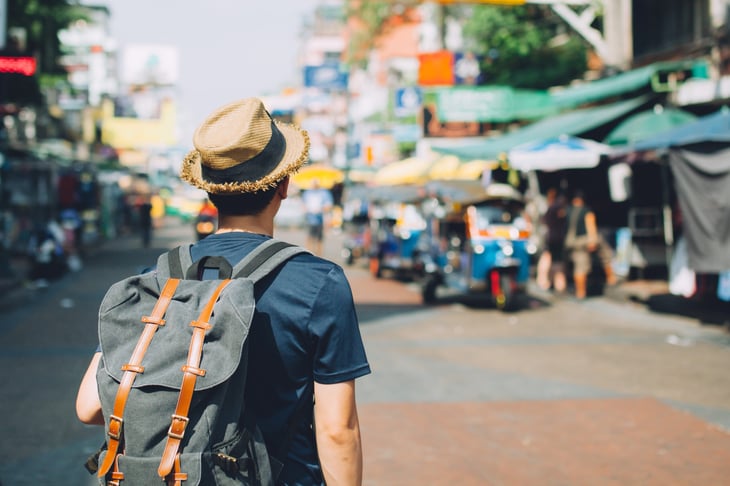
Editor’s Note: This story originally appeared on Living on the Cheap.
Travel insurance is no longer optional. After two years of travel disruptions that show no sign of ending any time soon, it’s more or less mandatory. So how do you buy travel insurance in this environment? Very carefully, say experts.
Two types of travel insurance

If you’re going to travel, it’s not a question of whether you need insurance, but what kind.
“Cancel for any reason” travel insurance. It costs between 10% and 12% of the price of your vacation, and it will refund at least part of your travel costs if you decide to cancel.
“Named perils” travel insurance. This is the more common kind of travel insurance. It’s less expensive (7% to 9% of your trip cost), but as the name implies, it only covers the perils named in the policy.
How to buy ‘cancel for any reason’ travel insurance

“Cancel for any reason” travel insurance is the breakout star of the coronavirus pandemic. Although it’s more expensive than standard “named perils” travel insurance, it is more flexible. Its main benefit is that if you change your mind about your trip, the policy guarantees a minimum of 75% of your money will be refunded.
“There are, of course, still 100% reimbursements for the normal miseries of the world” covered under travel insurance policies, such as disruptions or lost luggage, according to Jonathan Breeze, CEO of AardvarkCompare. “The 75% “cancel for any reason” benefit is simply an extra level of protection.”
AardvarkCompare has seen interest in “cancel for any reason” policies jump from just 5% to more than 50% since 2020. Because of this, insurers have made some changes. Cheryl Golden, director of marketing at InsureMyTrip, says a few companies reduced reimbursement percentages.
“But ‘cancel any reason’ remains widely available to those who meet the eligibility requirements, and we are not aware of any price increases,” she adds.
How to buy ‘named perils’ travel insurance

To find the best “named peril” travel insurance policy after the current crisis has faded, look at the past, advises Sherry Sutton, vice president of marketing at Travel Insured International.
“Travelers should review their plans carefully, as always, but they should also take time to review how the insurer managed the current situation,” she says. “How did they communicate, what type of coverage changes did they make, were they flexible?”
Fact is, some travel insurance companies were better than others. The best insurers offered more coverage and went the extra mile to help customers. Yes, some of the better insurance policies cost more. But you get what you pay for. (Forbes has a list of best and worse travel insurance companies.)
“Historically, there has been a lot of focus on price when purchasing a travel insurance plan,” says Sutton. “While price should always be a consideration, I think COVID-19 will highlight the need to spend a little more to get the right coverage in the future.”
Travel insurance after the pandemic focuses on health and money

So what should you look for in a post-pandemic travel insurance policy? Overall, there’s more of an emphasis on health — and money.
“Travelers should continue looking for policies that provide coverage from unexpected injuries, illness, or accidents,” explains Rachel Coen, a spokeswoman for G1G Travel Insurance. “Additionally, this current pandemic underscores the need to protect trip costs. Millions of trips were impacted by COVID-19 related global travel shutdowns, leaving travelers bearing the financial brunt of canceled flights, hotel reservations, and other nonrefundable trip costs.”
Pay attention to the refund terms. All travel insurance comes with a “free look” period of between 10 and 14 days after you buy the policy.
“If you’ve been forced to cancel your trip, and if you get a complete refund for your trip expenses, you should be able to cancel your policy and get a full refund of your premium,” says Erin Fish, co-founder of goWanderwell.com, a travel insurance site. “If your trip has been postponed to a later date — sometimes even up to over a year later — you should be able to request from your travel insurance company a policy postponement migration to reflect the new travel dates.”
At least one thing hasn’t changed about buying travel insurance.
“Always read the fine print,” says Pamella Seay, who teaches hospitality law at Florida Gulf Coast University in Fort Myers, Florida. “Examine the exclusions and determine what might not be covered.”
Pay close attention to how your insurance policy handles a “force majeure” or an act of God. Would the policy cover such an event, or would it be up to you to pay for your expenses?
What to look for in travel insurance

Medical issues. Chris Zimmel, a retired flight nurse, recommends studying the medical coverage provisions closely. “Will you be covered only if treated at the local hospital?” she says. “Will it cover transport to the nearest appropriate facility, as defined by the insurance company, to the closest hospital in the U.S., or all the way to your hometown? Don’t just assume you’ll be transported to your local hospital.” Also, consider air medical transport and travel security membership through a company like Medjet.
A future crisis. Generally, epidemics and pandemics aren’t covered. Try a “cancel for any reason” policy if you want coverage.
Quarantines. How does travel insurance deal with quarantines? Few policies addressed that at the beginning of the pandemic.
What to expect after you buy insurance

Going forward, travel insurance will offer some benefits that it didn’t before. For example, claim processing will take less time — even if there’s another pandemic. Companies have been deploying technology and systems that process and pay claims faster than ever.
At Allianz Travel, an initiative called SmartBenefits aims to pay customers in real time for qualifying flight delays without the need to submit receipts.
“SmartBenefits allows us to actively monitor customers’ flights and when we detect a significant delay, automatically file a claim for that delay,” says Daniel Durazo, a spokesman for Allianz. “This innovation has really changed how travel insurance works, and along with a robust mobile app and round-the-clock assistance, will be what travelers are looking for from travel insurance, in addition to coverage for trip cancellations and interruptions, medical emergencies and baggage issues.”
Don’t make these mistakes when buying travel insurance

When it comes to buying travel insurance, there are important new rules — and troubling new ways to lose money. But they are expensive travel insurance errors that you can easily avoid.
“Several travel insurance companies have added exclusions for COVID-19,” says Dan Skilken, president of Tripinsurance.com. “There really is no good reason for them doing this. So I would make sure if you are buying a plan for a future trip without this exclusion. The plan should cover you if you get sick and cannot travel, or you get sick during your trip from COVID-19.”
Error No. 1: Not getting enough coverage

Travelers need to make sure that they are purchasing the right coverage for their circumstances, says Kasara Barto, a spokeswoman for the travel insurance site Squaremouth.com. Look for policies offering coverage for some of travelers’ top concerns. Among them: cancellations for medical, economic and employment reasons.
Error No. 2: Getting the wrong kind of travel insurance

Beware of trip “protection,” which isn’t insurance, according to Terry Boynton, co-founder and president of Yonder. “Travel insurance is an actual insurance product backed up by large underwriting companies and state regulation,” he says. “Trip protection isn’t as secure and might only reimburse you in the form of a future travel credit, not cash, if you had to cancel your trip.”
Error No. 3: Not asking questions

Travel insurance is complicated — now more than ever. And it’s easy to make assumptions about what is — and is not — covered. Assume nothing, say the pros.
“Travelers tend to make the mistake of not reading the plan document ahead of time or taking the time to ask questions before buying to understand what is and is not covered,” says Jeremy Murchland, president of Seven Corners insurance.
Error No. 4: Ignoring the fine print

Not all travel insurance is equal. Some cheaper policies have significant exclusions that may make them worthless in the future, says Erin Fish, co-founder of the site goWanderwell.com.
“Some examples of the limitations and exclusions often seen in these plans can be low medical benefit maximums, medical benefits limited to emergencies only, no coverage for pre-existing conditions, no coverage for cancellation or interruption due to bankruptcy or default of your travel supplier,” says Fish.
Steve Dasseos, the head trip insurance guru for TripInsuranceStore.com, has another fine-print gotcha: “Don’t assume that all companies define the terms the same,” he says. For example, what date will count as your initial trip deposit date? It depends on the insurance company.
Error No. 5: Buying it from the wrong place

Michael Bonebright, a consumer analyst with DealNews.com, warns against buying insurance policies sold by a third party in a post-pandemic travel world. “Most people get travel insurance as an add-on from a travel site like Expedia or Hotels.com,” he says. “However, if you need to make a claim, you have to contact the insurer itself — not the travel site.”
Going directly to a reputable travel insurance company is also a good option. But do your homework, advises Dan Durazo, a spokesman for Allianz Travel Insurance.
“It’s important to know if the company is offering its own products or just marketing products from other companies, whether they manage their own claims process, whether they have 24/7 customer service and whether they have an in house travel assistance team that is available 24/7 to help with travel emergencies big and small, including medical emergencies and evacuations,” he says.
Bonebright also recommends shopping for a policy directly through a site that specializes in travel insurance. Those include InsureMyTrip.com, Squaremouth.com and TravelInsurance.com.
Error No. 6: Ignoring the pandemic exclusion

A lot of travel insurance policies have exclusions for epidemics and pandemics. That means if there’s another global outbreak of any kind, and you’re on a trip, your coverage may be limited — or nonexistent.
“Be sure to choose a plan without a pandemic exclusion,” says Lisa Cheng, a spokeswoman for World Nomads.
This is by no means an exhaustive list of errors you could make when buying travel insurance. But in a new world of travel, you have to protect your next trip against a possible pandemic.
